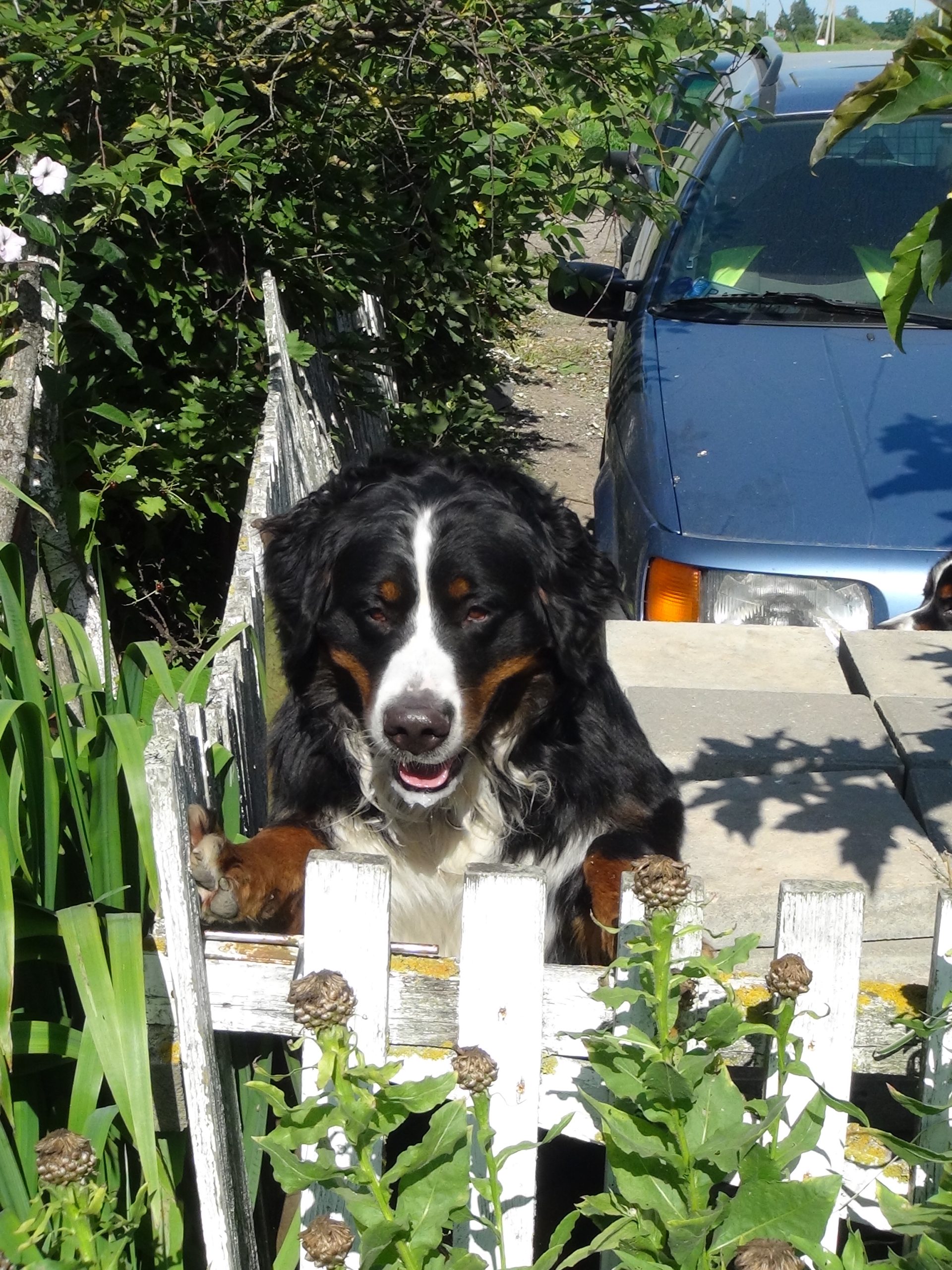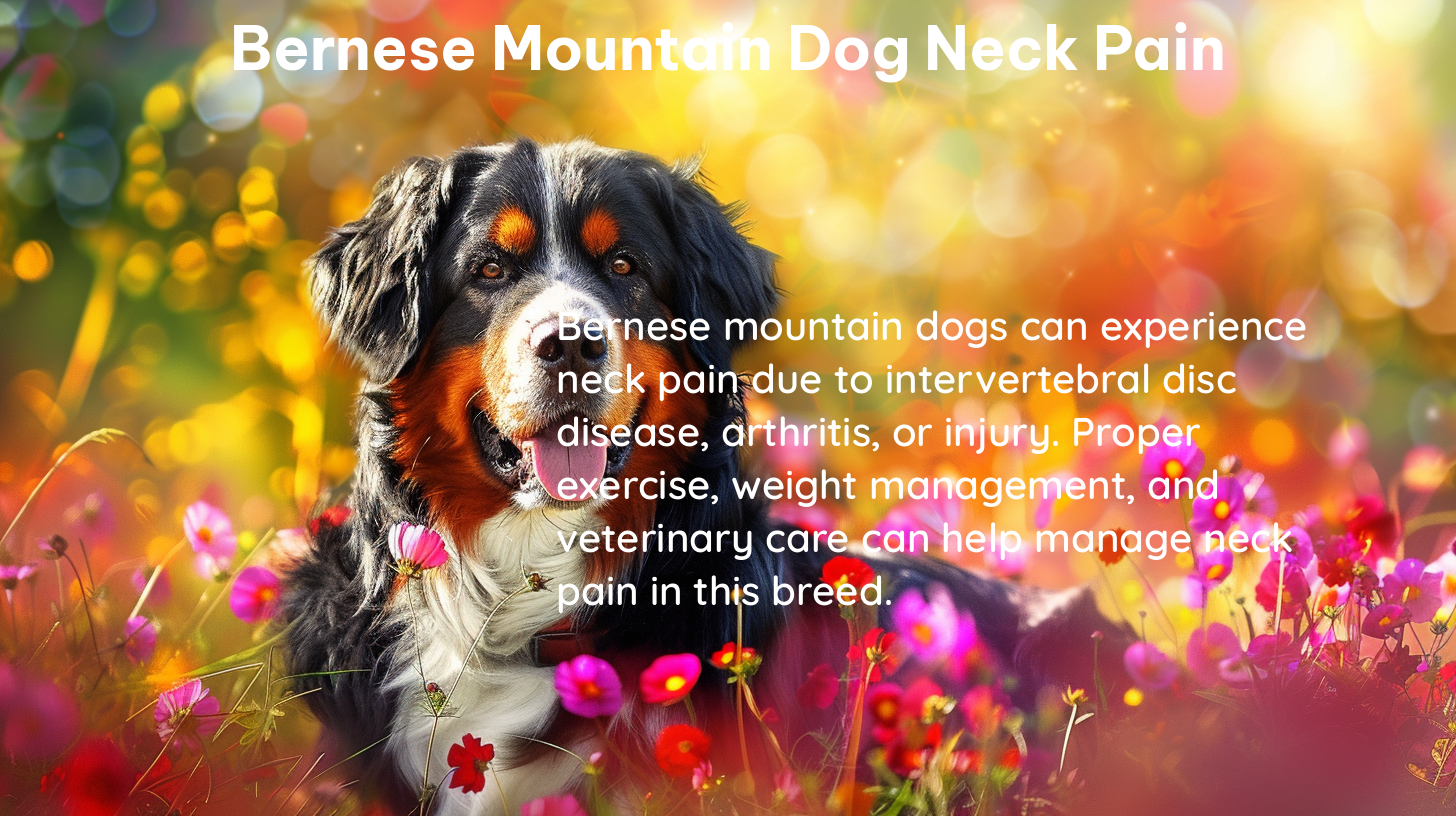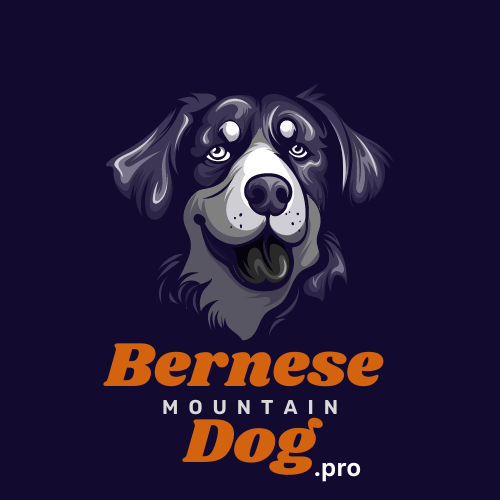Bernese Mountain Dogs are prone to various health conditions that can cause neck pain, including aseptic meningitis, steroid-responsive meningitis-arteritis (SRMA), and wobbler syndrome. Understanding the common causes of neck pain in this breed and how to identify and manage it is crucial for their well-being.
Common Causes of Neck Pain in Bernese Mountain Dogs

Aseptic Meningitis
Aseptic meningitis is a serious condition characterized by inflammation of the meninges, which cover the spinal cord and brain. It can cause severe neck pain, fever, and stiffness. Bernese Mountain Dogs are among the breeds most commonly affected by aseptic meningitis, particularly those under two years of age.
Steroid-Responsive Meningitis-Arteritis (SRMA)
SRMA is an immune-mediated disease that can cause neck pain, fever, and stiffness. It is relatively common in Bernese Mountain Dogs and can be diagnosed through a combination of physical examination, laboratory tests, and imaging studies such as MRI.
Wobbler Syndrome
Also known as cervical stenotic myelopathy, wobbler syndrome affects the cervical spinal cord and can cause neck pain, scuffing nails, stumbling, and difficulty walking. Bernese Mountain Dogs are among the breeds commonly affected by this condition, typically in early to mid-adulthood.
Beagle Pain Syndrome
While primarily associated with Beagles, Beagle Pain Syndrome can also affect Bernese Mountain Dogs. This condition is characterized by neck pain, stiff gait, and fever.
Identifying Neck Pain in Bernese Mountain Dogs

To identify neck pain in your Bernese Mountain Dog, look for the following signs:
- Stiffness in the neck and back
- Difficulty walking or standing
- Muscle spasms
- Dizziness or fainting
- Fever
If you suspect your dog is experiencing neck pain, it’s crucial to consult a veterinarian immediately. The diagnosis will involve a thorough physical examination, laboratory tests, and imaging studies such as MRI or CT scans.
Managing Neck Pain in Bernese Mountain Dogs
The management of neck pain in Bernese Mountain Dogs typically involves a combination of medical and surgical treatments.
Medical Treatment
Medical treatment may include:
- Pain medication
- Anti-inflammatory drugs
- Reduced activity
These treatments aim to alleviate the symptoms and manage the underlying condition.
Surgical Treatment
In more severe cases, surgical intervention may be necessary to alleviate spinal cord and nerve compression. This can include procedures such as decompression surgery or stabilization of the affected vertebrae.
It’s important to work closely with your veterinarian to develop a comprehensive treatment plan that addresses the specific needs of your Bernese Mountain Dog.
Preventing Neck Pain in Bernese Mountain Dogs
While some causes of neck pain in Bernese Mountain Dogs are genetic or immune-mediated, there are steps you can take to help prevent or minimize the risk:
-
Maintain a Healthy Weight: Keeping your Bernese Mountain Dog at a healthy weight can reduce the strain on their neck and spine.
-
Provide Appropriate Exercise: Engage your dog in low-impact activities that don’t put excessive stress on their neck and back, such as leashed walks, swimming, and gentle playtime.
-
Encourage Proper Posture: Ensure your Bernese Mountain Dog maintains good posture during activities and when resting, as poor posture can contribute to neck pain.
-
Regular Veterinary Checkups: Schedule routine veterinary checkups to catch any potential issues early and monitor your dog’s overall health.
By understanding the common causes of neck pain in Bernese Mountain Dogs and taking proactive steps to prevent and manage it, you can help ensure your furry friend enjoys a comfortable and healthy life.
References
- WagWalking. (n.d.). Aseptic Meningitis in Dogs – Symptoms, Causes, Diagnosis, Treatment, Recovery, Management, Cost. Retrieved from https://wagwalking.com/condition/aseptic-meningitis
- Troxel, M. (2015). A pain in the neck: Case report and disease description. Retrieved from http://blog.vetbloom.com/neurology/a-pain-in-the-neck-case-report-and-disease-description/
- Ohio State University College of Veterinary Medicine. (2016). Wobbler Syndrome. Retrieved from https://vet.osu.edu/research/wobbler-syndrome
- DVM360. (2015). Gentle giants: Appeal to veterinary clients with Bernese Mountain Dogs using these social media posts. Retrieved from https://www.dvm360.com/view/gentle-giants-appeal-veterinary-clients-with-bernese-mountain-dogs-using-these-social-media-posts
- Texas A&M Veterinary Medical Teaching Hospital. (n.d.). Wobbler Syndrome. Retrieved from https://vethospital.tamu.edu/small-animal/neurology/wobbler-syndrome/.

Sarah Johnson
Sarah Johnson is a devoted Bernese Mountain Dog enthusiast and regular contributor to Bernese Mountain Dog Pro. With over a decade of experience in raising and training Berners, Sarah brings practical knowledge and passion to her writing. Sarah lives in Colorado with her two Berners, Max and Bella.